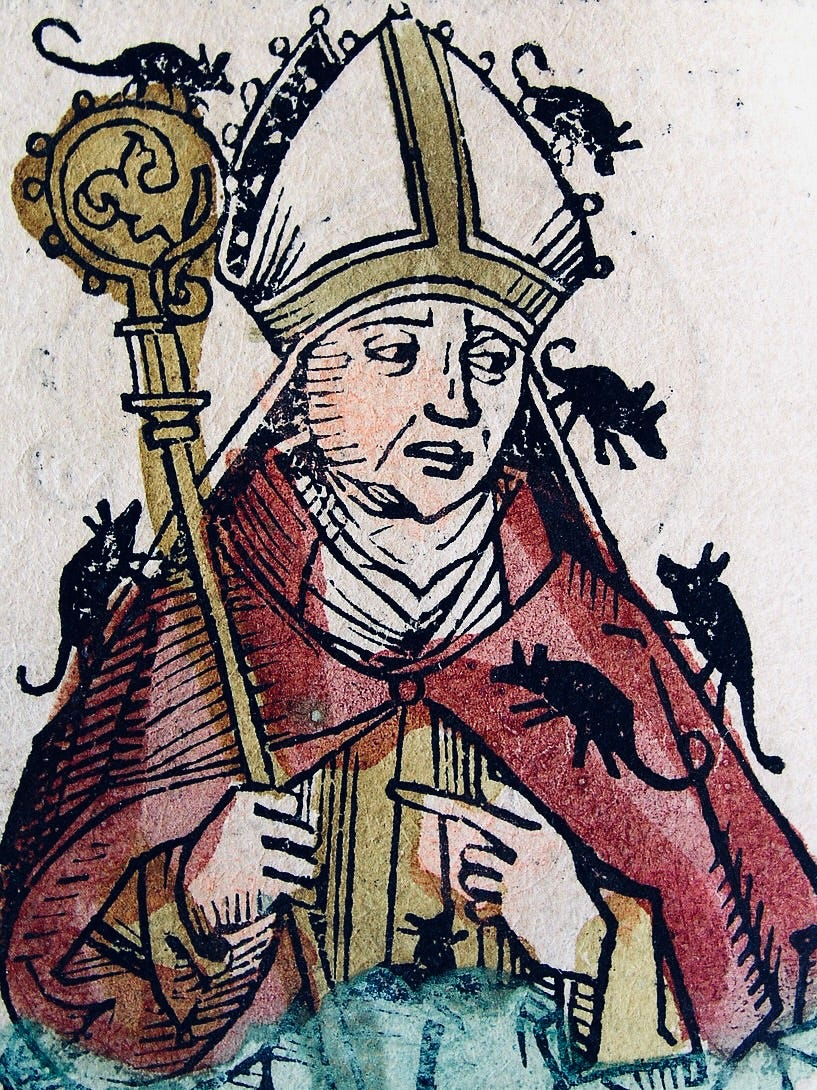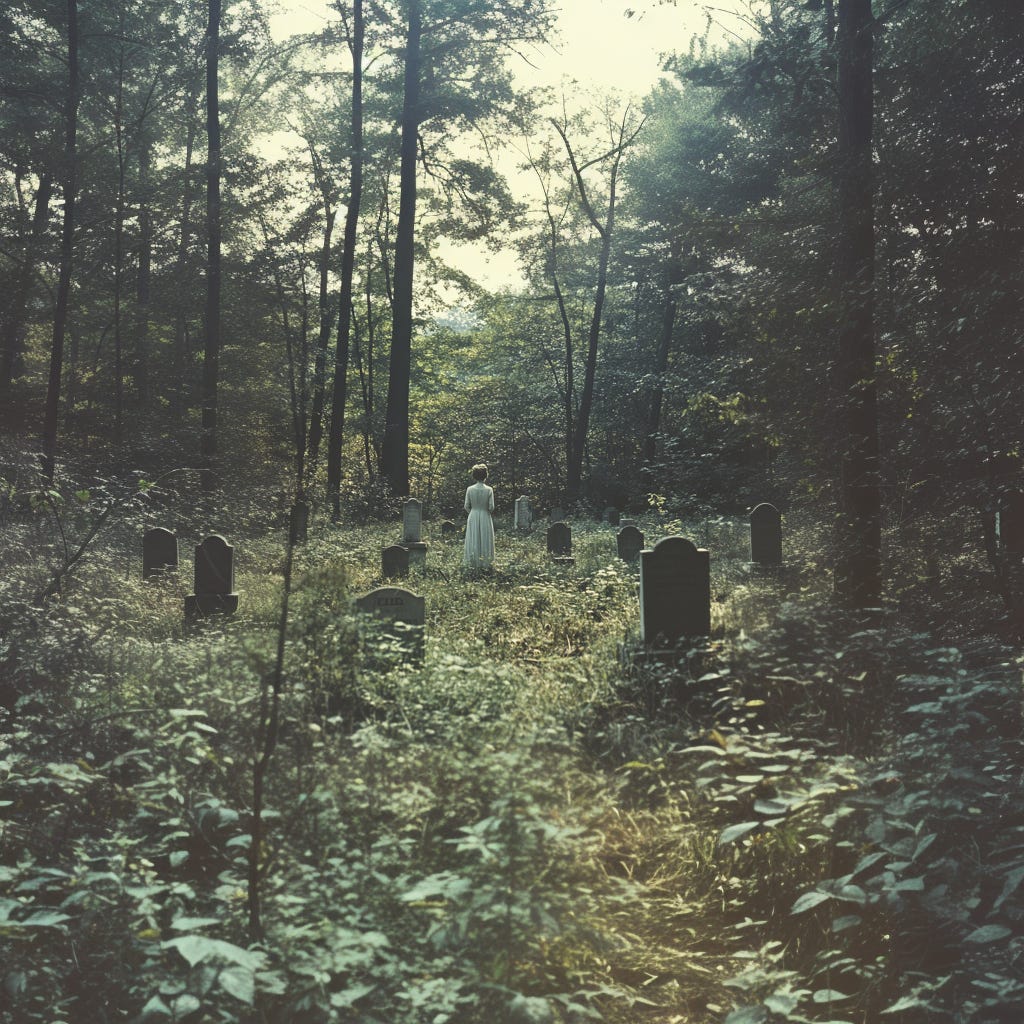Bishop Hatto’s Knucklebones
A Southern Gothic Tale
They have whetted their teeth against the stones,
And now they pick the bishop’s bones;
They gnawed the flesh from every limb,
For they were sent to do judgment on him.
(“God's Judgment On A Wicked Bishop” by Robert Southey)Bishop Hatto’s Knucklebones
The elderly man sat in his La-Z-boy staring out the window. It was mid-July and he was eyeballin’ the tufted wheat wavin’ in the Irishman’s field along the southwest bank of the Guadalupe River. It weren’t raining; but a bucketful of thunder bellowed in the distance and brought with it all the portentousness of Great-Granny Gertrude’s witchin’ sessions, when she’d pull out those tawny knucklebones that were said to belong to wicked Bishop Hatto of Mainz, who got chewed up by rats in a tower smack dab in the middle of the Rhine when he withheld his stores of wheat from his starvin’ flock. And the wheat bendin’ in the wind reminded Rolf of the tale.
Great-Granny Gertrude prefaced her prognostications with a ratlike clickin’ of the tongue before falling into a gibberin’ converse with unseen things you could almost feel pressin’ up against you in the room. She’d roll those knucklebones like a crap shooter; and they’d land in a painted tray she’d brought over from Hesse-Cassel when she crossed the Atlantic sometime around 1868.
She lived to be a hundred and five (plus three months). And since Rolf himself was five years (plus three months) old the day she died, he’d always suspected she’d kept that black soul of hers trapped in the flesh beyond her centenary for the sole purpose of doin’ the thing she’d done to him the night she shuffled off this mortal coil. But he was havin’ a helluva time now tryin’ to recall what it was she’d done.
Gertrude never lost an opportunity to criticize Catholics; and when one was introduced to her, she’d pretend she was deaf as well as blind and push their hands away. Aside from the recalcitrant dead, the hag could make out the flittin’ shadows of her livin’ kin through those milky-white eyes of hers. She was as mad as a hatter. No doubt about it: Kein Zweifel (as mama used to say in her slack-jawed drawl).
The old crone told fortunes at family get-togethers in a high-handed fashion that pissed everyone off. And those that got talked about pooh-poohed her and said it weren’t true; but then they’d get gainsaid and die; or hare off and get their hearts broke so bad as to lose all sense of compassion for their fellow creatures and yearn for nothin’ more than to join that chorus of far-seein’ specters Great-Granny Gertrude governed.
Speakin’ of speakin’ with the dead, Rolf thought, it’s time . . .
“Dad,” the middle-aged blonde woman said. “You still wanna go to mom’s grave today?”
Funny how dad sounded like dead in this part of Texas. “Why wouldn’t I wanna go? Today’s the anniversary of her passin’, ain’t it?” He opened his mouth and cocked his head to the side, as if he were about to say something else. But all he was doin’ was seein’ if the woman at the threshold replied, which she did.
“Prolly gonna rain.”
“Rain don’t bother me none,” Rolf said.
Ragin’ Rolf, Rattlesnake Rolf, most unpleasant bastard in New Braunfels. That’s what they called him. But he hadn’t always been that way. It was the shrapnel from the grenade in his head that made him unlikable. Oh, how life-changing that night in ’44 had been when they stormed Leyte Beach! And when he come back to Texas, the only people that could stand to be around him were his parents and Anna, the nurse from Galveston whom he’d married.
“Wanna bring an umbrella with you in case?” The woman picked a magazine up off the floor.
“No,” Rolf said, rising from the chair. “I wanna feel God’s spit and scorn.”
They exited the house and threaded their way through the front yard’s boulders, rusted-out cars, and cacti. They crossed through a dried-up creek bed and passed into a copse of trees.
There was a clearing in the woods where an old Lutheran cemetery was located, which was founded in 1855 by the Mainzer Adelsverein (The Nobility Society of Mainz). Nowadays, it was overrun with weeds and bracken. It had no caretaker and not much space left to accept new bodies.
Rolf had managed to guarantee in his will that he would be laid to rest next to his wife. He himself had chiseled the shared headstone and carved that medical symbol onto it that depicted a stick with two snakes tangled round it, since Anna had been a nurse.
The land on which the cemetery was situated had been sold umpteen years ago to a firm that rented it out for cattle to graze on. But the cemetery hadn’t been touched since it was designated a historical monument by the state of Texas and was deep enough in the woods that the livestock couldn’t get to it.
Rolf walked arm-in-arm with his daughter through the trees; and it started to pepper rain. He was thinkin’ of the war and how the German-American G.I.s had generally been sent to places other than Germany for fear they might go over to the enemy. That’s how he’d ended up in the South Pacific. Even after the war, people got jumpy when they saw Texans speakin’ Deutsch in public places. So his family collectively decided to stop speakin’ it altogether—even at home.
He remembered a few words, like Stinkkatze (for skunk) and Hexe (for witch), ’cause that’s what Great-Granny Gertrude had been called. But he could no longer hold conversations in it; and since he got headaches when he thought too hard about things, he tended to change the channel when he German spoken on TV or the radio. I have enough trouble gettin’ by in English, he mused.
He glanced at his daughter warily. “I wanna ask you somethin’. When we come out here last year, did you see someone standin’ in the clearing? It was sunny and hazy. Remember?”
“I didn’t see nothin’, dad.”
Rolf jerked his arm away from hers and peered into the clearing. With his right cowboy boot he’d inadvertently kicked over a black headstone that was so eroded that only a faint cross in the middle of it could be discerned.
He stepped into the clearing, and, minding his footsteps, passed between the graves and undergrowth. He located Anna’s headstone and crouched down in front of it. His name and birth were chiseled on the left-hand side. It’s been sittin’ here for decades waitin’ for my death date to be scribbled in.
He frowned and gently caressed the text on the right-hand side:
Anna Irene Hoppe (née Scheibel)
January 25, 1926–July 15, 1950
“What’s that?” he asked, and mimicked the clickin’ sound he heard beneath the rain’s steady tattoo.
His eyes were drawn to a tiny headstone next to Anna’s grave that was covered in ferns.
“Prolly cicadas singin’, dad.”
He’d already forgotten that his daughter had come with him.
“Wait,” he said, standing up. “The cicadas round here don’t sing in the rain.”
When he wheeled around, the woman was gone. A gust of wind whipped through the clearing and blew aside the ferns concealing the tiny headstone. He read the inscription. Then it all came back to him. . .
Anna died in childbirth; and their daughter, Brigitte, passed away in Rolf’s arms moments later. The woman he thought was his daughter (who looked like Anna) was the nurse who came twice a week to check up on him. She had never walked with him to the cemetery. The doctor told him the Alzheimer’s would only get worse.
Rolf looked down at the raindrops falling into the cups of his hands. The water trickled between his fingers.
He remembered that night—when he was five years and three months old. It was after the Thanksgivin’ dinner, and the family started moanin’—not out of indigestion, but because Great-Granny Gertrude had revealed Rolf’s future. The boy was playin’ in another room and hadn’t heard what she’d said. His parents’ faces took on a lusterless and spent look. Then everyone heard a ratlike click of the tongue that changed into a gravelly death rattle. The tray fell from the Hexe’s lap. Bishop Hatto’s knucklebones clattered to the floor; and by the time they landed, Great-Granny Gertrude was gone.
Rolf waited for the full magnitude of this stray recollection to condense in his addled and jelly-like mind. He wanted to weep and grieve anew. He wanted to mourn the things he’d lost before the memories of these losses were themselves lost.
Suddenly, the rain stopped and the sun filtered through the trees. He heard a familiar voice, and turned to confront the speaker.
“Anna?” His face brightened when he saw her wearing the dress she’d had on the day he proposed to her. “What are you doing here?”
“I’ve come to take you home.”






Oh, that was so good. And so close to real I couldn't believe it. Prolley 'cause my Mother-in-law had dementia and that's probably what it was like for her. Loved it.
A beautifully told little story, Daniel about the ghosts we carry with us to the very end. A tragic ending in this tale, but, maybe one that was also uplifting as well
Excellently done 👍🏼